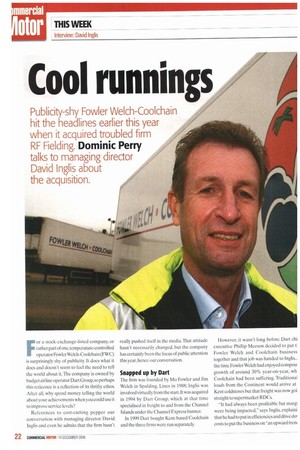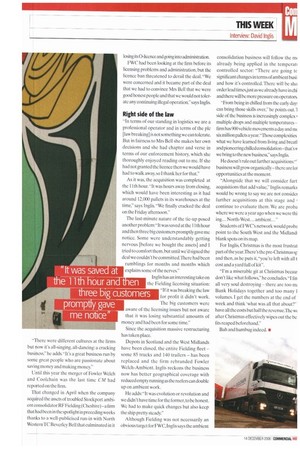Cool runni
Page 22

Page 23

If you've noticed an error in this article please click here to report it so we can fix it.
Publicity-shy Fowler Welch-Coolchain
hit the headlines earlier this year when it acquired troubled firm
RE Fielding. Dominic Perry
talks to managing director David Inglis about the acquisition.
For a stock-exchange-listed company, or rather part of one,temperature-controlled operator FowlerWelch-Coolchain (EWC) is surprisingly shy of publicity. It does what it does and doesn't seem to feel the need to tell the world about it. The company is owned by budget airline operator Dart Group, so perhaps this reticence is a reflection of its thrifty ethos. After all, why spend money telling the world about your achievements when you could use it to improve service levels?
References to cost-cutting pepper our conversation with managing director David Inglis and even he admits that the firm hasn't really pushed itself in the media. That attitude hasn't necessarily changed, but the company has certainly been the focus of public attention this year, hence our conversation.
Snapped up by Dart
lhe firm was founded by Mo Fowler and Jim Welch in Spalding. Lincs in 1988; Inglis was involved virtually from the start. It was acquired in 1994 by Dart Group, which at that time specialised in freight to and from the Channel Islands under the Channel Express banner.
In 1999 Dart bought Kent-based Coolchain and the three firms were run separately. However, it wasn't long before Dart chi executive Phillip Meeson decided to put tl Fowler Welch and Coolchain business together and that job was handed to Inglis., the time Fowler Welch had enjoyed compou growth of around 30% year-on-year, wh Coolchain had been suffering. Traditional loads from the Continent would arrive at Kent coldstores but that freight was now goi straight to supermarket RDCs.
-It had always been profitable but margi were being impacted," says Inglis, explaini that he had to put in efficiencies and drive do, costs to put the business on "an upward treni "There were different cultures at the firms but now it's all-singing, all-dancing: a cracking business," he adds. "It's a great business run by some great people who are passionate about saying money and making money."
Until this year the merger of Fowler Welch and Coolchain was the last time CM had reported on the firm.
That changed in April when the company acquired the assets of troubled Stockport ambient consolidator RF Fielding (Cheshire )-a firm that had been in the spotlight in preceding weeks thanks to a well-publicised run-in with North Western TC Beverley Bell that culminated in it losing its 0-licence and going into administration.
FWC had been looking at the firm before its licensing problems and administration, but the licence ban threatened to derail the deal. "We were concerned and it became part of the deal that we had to convince Mrs Bell that we were good honest people and that we would not tolerate any continuing illegal operation."says Inglis.
Right side of the law
"In terms of our standing in logistics we are a professional operator and in terms of the plc [law breaking] is not something we can tolerate. But in fairness to Mrs Bell she makes her own decisions and she had chapter and verse in terms of our enforcement history, which she thoroughly enjoyed reading out to me. If she had not granted the licence then we would have had to walk away, so I thank her for that."
As it was, the acquisition was completed at the 11th hour. -It was hours away from closing, which would have been interesting as it had around 12,000 pallets in its warehouses at the time," says Inglis. "We finally cracked the deal on the Friday afternoon."
The last-minute nature of the tie-up posed another problem:"It was saved at the 11th hour and then three big customers promptly gave me notice. Some were understandably getting nervous [before we bought the assets] and! tried to comfort them, but until we'd signed the deal we couldn't be committed.There had been rumblings for months and months which explains some of the nerves."
Inglis has an interesting take on the Fielding licensing situation: "If it was breaking the law for profit it didn't work. The big customers were aware of the licensing issues but not aware that it was losing substantial amounts of money and had been for some time."
Since the acquisition massive restructuring has taken place.
Depots in Scotland and the West Midlands have been closed, the entire Fielding fleet some 85 trucks and 140 trailers has been replaced and the firm rebranded Fowler Welch-Ambient, Inglis reckons the business now has better geographical coverage with reduced empty running as the reefers can double up on ambient work.
He adds: "It was evolution or revolution and we didn't have time for the former, to be honest. We had to make quick changes but also keep the ship pretty steady."
Although Fielding was not necessarily an obvious target for FWC, Inglis says the ambient consolidation business will follow the m( already being applied in the temperati controlled sector: "There are going tc significant changes in terms of ambient busil and how it's controlled. There will be sho order lead times, just as we already have in chi and there will be more pressure on operators.
"From being in chilled from the early day can bring those skills over," he points out.] side of the business is increasingly complex multiple drops and multiple temperatures firm has 900 vehicle movements a day and nu. six million pallets a year."Iliose complexities what we have learned from living and breatl and pioneering chilled consolidation that's NI we bring to the new business," says Inglis.
He doesn't rule out further acquisitions:business will grow organicallythere are lot opportunities at the moment.
"Alongside that we will consider furt acquisitions that add value," Inglis remarks would be wrong to say we are not considei further acquisitions at this stage and , continue to evaluate them. We are proba where we were a year ago when we were thi ing... North-West... ambient..."
Students of FWC's network would proba point to the South West and the Midland: blank spots on its map.
For Inglis, Christmas is the most frustrat part of the year.Th ere's the pre-Christmas sp and then, as he puts it,"you're left with all t cost and a yard full of kit".
"I'm a miserable git at Christmas becaw don't like what follows," he concludes. "1 fin all very soul destroying there are too nu Bank Holidays together and too many I volumes. I get the numbers at the end of week and think 'what was all that about?' ' have all the costs but half the revenuelbe w( after Christmas effectively wipes out the be fits reaped beforehand.
Bah and humbug indeed. •
















































































































































































